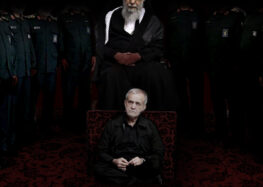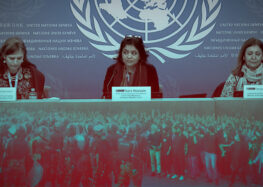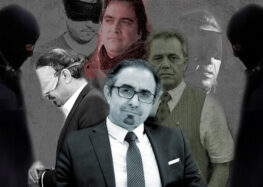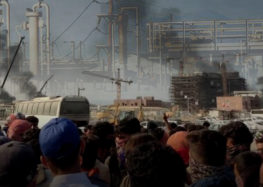Sham Investigation of Labor Activist’s Alleged Torture Lacks Impartiality, Ignores Witnesses
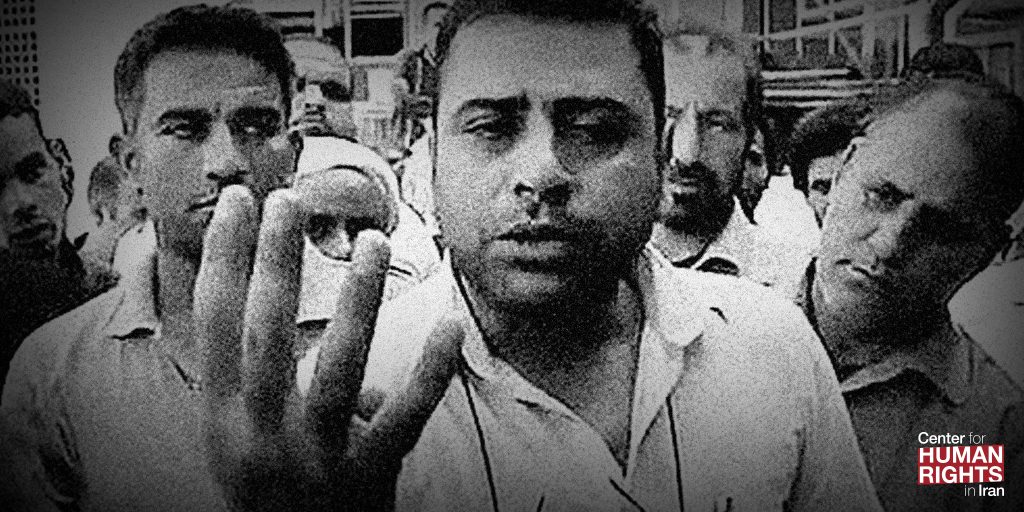
Iran Must Re-Open an Independent and Impartial Investigation into Labor Activist’s Abuse
Multiple Cases of Alleged Torture Must Be Thoroughly Investigated
January 17, 2018—After a brief and deeply flawed investigation lacking any semblance of impartiality, the authorities in Iran have denied that labor activist Esmail Bakhshi was tortured in an Intelligence Ministry detention center in Ahvaz, Khuzestan Province in Iran.
Relying on statements by officials who were themselves possibly implicated and ignoring critical evidence by credible witnesses, officials dismissed the torture allegations and have engaged in a campaign of smears and intimidation aimed at silencing and discrediting the labor activist.
The Center for Human Rights in Iran (CHRI) calls on the authorities in Iran to:
- Conduct a thorough and impartial investigation into allegations regarding Bakhshi’s torture, which must include the protection of all witnesses and comply with international standards as delineated in UN General Assembly Resolution 55/89.
- Immediately cease the defamatory public statements by officials aimed at discrediting Bakhshi and ensure the immediate cessation of all threats against the labor activist.
- Hold accountable all officials found responsible or implicated in any way in the abuse of any individual held in state custody and prosecute them to the full extent of the law.
- Identify measures needed to prevent torture and to address it effectively when it occurs, and ensure that relevant legislation and mechanisms are adopted and instituted.
Bakhshi, a representative of the Haft Tappeh sugarcane company workers in Shush, Khuzestan Province, was arrested on November 20, 2018, in connection with protests to demand unpaid wages and held for 25 days in the Intelligence Ministry’s detention center in Ahvaz. On January 4, 2019, he revealed on Instagram that he had been severely beaten during his detention and left with serious physical injuries.
“The authorities’ woefully inadequate ‘investigation’ of Bakhshi’s alleged torture shows there is no system in place to address torture in Iranian detention centers, and violence against detainees can be inflicted with complete impunity,” said Hadi Ghaemi, CHRI’s executive director.
Multiple Eye Witnesses Confirm Bakhshi’s Torture, None Consulted During the Investigation
Bakhshi detailed his repeated brutal beatings and lasting injuries in his graphic Instagram post. Others subsequently confirmed his account.
A source who was among the workers arrested with Bakhshi who asked not to be named for security reasons told CHRI that during his arrest Bakhshi was so violently beaten by security police and Intelligence Ministry agents that he lost consciousness and was feared dead.
“They took us to a vehicle to be transferred to Ahvaz. Before we got inside, they started beating Esmail Bakhshi and we could hear him saying, ‘You broke my rib, my head….’ They really had a grudge against Bakhshi. They kept finding an excuse to slap him and kick him. We had blindfolds on and we could only hear sounds. We got into the vehicle but Bakhshi said he couldn’t walk so the agents dragged him and threw him in the back of the vehicle.”
The source continued, “As soon as we got into the vehicle, the agents began to hurl sexual insults at [civil rights activist] Sepideh Qoliyan [who was arrested along with Bakhshi on November 20th and held at the detention center for 30 days] and asked her which workers she was sleeping with. She told them the workers were her brothers and she was at their protest to make a report. They called her a liar and threatened to clarify the matter inside the detention center. The agents struck her neck with batons and attacked the others too but not as violently as they did Bakhshi.”
“When the vehicle reached outside Shush the agents started to attack Bakhshi with batons. We could hear him saying, ‘My back!’ We heard one agent saying, ‘Don’t hit his nose!’ They were beating him so bad it made us cry. They asked him what his name was but he couldn’t speak and give an answer so they would beat him some more until he would give a broken answer.”
“Before we reached our destination, Bakhshi suddenly stopped making noise. One of the agents said ‘it’s enough, let him catch his breath’ …But then Bakhshi moaned and regained consciousness. After all the beatings, Bakhshi had already been crushed and broken before we reached the detention center.”
The source added, “They beat up Bakhshi for two hours between Shush and Ahvaz. They would sometimes hit the others with their batons too but they were mostly busy beating Bakhshi. They said, ‘You wanted to start a Revolution in Haft Tappeh?’ When he objected, they would hit him harder. When they took Bakhshi out of the vehicle and took him inside to the detention center, we were walking behind and we could see the blood on the ground dripping from his nose.
“They immediately put us inside separate cells but the cells were close to each other and we could hear the interrogators beating the detainees. They were beating Bakhshi harder than the others. After the second week, the beatings became less frequent.”
Asal Mohammadi, a pharmaceutical student at the University of Tehran and a member of the editorial board at Gam, an independent news channel on the Telegram messaging app, has stated she was detained in an adjacent room when Bakhshi and Sepideh Qoliyan were being interrogated. (Mohammadi was arrested on November 4, 2018 for reporting about the Haft Tappeh protests; she was released on bail on January 5.)
“I witnessed [Sepideh Qoliyan] being interrogated for long hours, from 10 in the morning until around midnight, almost on a daily basis,” Mohammadi wrote on Instagram.
“I could hear her screams and her interrogator’s insults from an adjacent room. One day I witnessed them putting so much pressure on her to make false confessions that she was scratching her face. I could also hear Esmail [Bakhshi’s] constant coughing and breathing difficulties from the adjacent interrogation room and I heard the agents saying, ‘He’s putting on an act. He feels better than us.’”
After her release on bail, the rights activist Sepideh Qoliyan tweeted on January 9th: “During Esmail Bakhshi’s arrest, I witnessed him being brutally beaten and when he was interrogated I saw him being humiliated…I’m ready to give testimony about myself and Esmail Bakhshi in any fair trial.”
None of these witnesses were asked or allowed to contribute evidence to the so-called investigation into Bakhshi’s alleged torture.
Two-Day “Investigation” is a Farce
On January 14, 2019, Prosecutor General Mohammad Jafar Montazeri denied Bakhshi had been tortured and accused him of making false claims for political reasons.
“[Our fact-finding] team did a complete investigation for two whole days and spoke to a series of people who had full knowledge of this matter and gathered information from experts and delivered a comprehensive report,” Montazeri said.
A two-day “investigation,” which also did not include interviews with key witnesses, does not conform in any way to international legal standards.
The UN’s Principles on the Investigation of Torture (UN General Assembly Resolution 55/89) require “clarification of the facts” and state: “The investigative authority shall have the power and obligation to obtain all the information necessary to the inquiry…[and] shall have at their disposal all the necessary budgetary and technical resources for effective investigation. They shall also have the authority to oblige all those acting in an official capacity allegedly involved in torture or ill-treatment to appear and testify. The same shall apply to any witness.”
On January 11, Bakhshi’s lawyer, Farzaneh Zilabi, told the state news agency IRNA that her client was interviewed about his torture claims but not by the full fact-finding team. (The members of the prosecutor general’s fact-finding team have not been disclosed.)
“There was a meeting with one of the members of the commission appointed by the prosecutor general. All the members were not present. In the meeting my client presented statements which were recorded in the proceedings,” said Zilabi.
Smear Campaign against the Victim
As Prosecutor General Montazeri announced the “investigation” had concluded there was no torture, he added, “I would like to inform the people that the news reports about this matter were basically lies and there were no beatings or injuries or torture and the person who made the claims about being tortured had his own particular political motives.” He added: “This individual was not just an ordinary guy. He had ties to certain quarters and it appears that he made these torture claims to cover up his own crimes.”
Defamation of activists and dissidents through false claims and statements by officials is a long-standing tool used by the authorities in Iran to discredit activists and dissidents.
On January 10, 2019, Hossein Shariatmadari, the hardline conservative editor-in-chief of Kayhan newspaper, wove his own conspiracy theory, accusing Bakhshi of collaborating with Komala, a militant Kurdish organization, and demanded he be punished for “slandering courageous Intelligence Ministry agents.”
“Don’t you see they made up this whole thing to validate the European Union’s decision to impose sanctions on the Intelligence Ministry? I hope we are not going to be sucked into the enemy’s trap any further and will not give foreign enemies and their internal lackeys any more opportunities to poison the air,” he wrote.
Investigation Lacks Required Impartiality
Following Bakhshi’s revelations, several lawmakers had demanded answers from the Intelligence Ministry, and the Speaker Ali Larijani agreed to an investigation by the Parliamentary Committee on National Security and Foreign Policy Affairs.
In an op-ed in Etemad newspaper on January 6, First Deputy Parliament Speaker Ali Motahhari wrote: “The letter to the Intelligence Minister from Haft Tappeh sugarcane worker Mr. Esmail Bakhshi, who was in detention for a period, should be a wake call for all those with an awakened conscience and defenders of citizens’ rights who must follow up this matter until it reaches a clear conclusion.”
However, on January 8, after a meeting between Intelligence Minister Mahmoud Alavi and a group of lawmakers, the chairman of the national security committee, Heshmatollah Falahatpisheh, dismissed the labor activist’s disclosures. The Intelligence Ministry controls the detention centers in which Bakhshi stated he was tortured—yet this did not rule out the Intelligence Minister as a source of information for the investigation.
The reliance on such officials is in direct violation of the UN Principles, which require impartiality. These principles state: “The investigators, who shall be independent of the suspected perpetrators and the agency they serve, shall be competent and impartial.”
The Human Rights Committee, the UN body interpreting the International Covenant on Civil and Political Rights (ICCPR), which Iran is a State Party to, also states that the absolute prohibition of torture articulated in Article 7 requires that any alleged act of torture be investigated “impartially by competent authorities.”
Falahatpisheh said the lawmakers were shown security footage that indicated Bakhshi had been injured when he resisted arrest, not as a result of torture. He also claimed that the labor activist had “confessed to being a member of a communist labor organization whose intention is to spread protests.”
The Islamic Republic has a long history, documented by the UN and many international human rights organizations, of forcing detainees through physical and psychological abuse to make false confessions and then airing those “confessions” on state TV to discredit them and justify the state’s prosecution.
Statements by Mojtaba Zolnour, another member of the committee, also revealed that meetings were held with individuals that could not be considered impartial. “Esmail Bakhshi’s case was carefully discussed in our meeting with the Intelligence Minister as well as relevant assistants and experts from Khuzestan Province,” Zolnour said in an interview with the parliamentary news agency, ICANA, on January 11. Khuzestan Province was where the detention center in which Bakhshi was tortured was located.
He added: “All the discussions about Esmail Bakhshi being tortured are complete lies. Based on documents presented to the committee by intelligence officials, Bakhshi was not tortured, flogged or anything. His confessions, and leads followed by the authorities, indicate that Esmail Bakhshi was a member and supporter of the Worker-Communist Party of Iran.”
In other words, intelligence officials assured the investigators that intelligence officials did not torture Bakhshi. This does not meet international requirements for an independent and impartial investigation.
Lawyer Reveals Authorities’ Threats against Bakhshi
On January 9, attorney Zilabi said the authorities had threatened that if Bakhshi refused to withdraw his torture allegations they would air clips of Bakhshi’s so-called “confessions” on the national state broadcaster. Again this demonstrates the Iranian authorities’ complete disregard for international laws and standards.
The UN Principles on Torture Investigations state: “Alleged victims of torture or ill-treatment, witnesses, those conducting the investigation and their families shall be protected from violence, threats of violence or any other form of intimidation that may arise pursuant to the investigation.”
The film has already been shown to members of Parliament, Zilabi said.
“Parliament should be the voice of the people instead of defending a particular ministry. Also, I’m shocked that a lawmaker is passing judgement in the preliminary investigation stage before a court verdict,” the attorney added.
Public Outcry against Torture Continues
With the public outcry over torture in Iran’s detention centers continuing in the wake of Bakhshi’s revelations, many expressed disgust with the dismissal of Bakhshi’s allegations. Under the Farsi hashtag “I was also tortured” former political prisoner Majid Dorri tweeted: “When we were being arrested, we flung our faces at their fists and kicked our backs into their feet. Sometimes they would defend themselves and for our own protection they put cuffs on our hands and feet and blindfolded us.”
In a post echoed by many, sociology student Hesam Salamat wrote: “The entire ruling establishment is scrambling to put a lid on Bakhshi’s struggle for justice. The establishment holds all the power while Bakhshi has nothing other than a loud voice determined to speak the truth. His voice resonates louder than all the state’s hullabaloo and propaganda. May the truth prevail over power.”
“The persistent torture of individuals in state custody and the high cost of speaking out against it makes it nearly impossible for the people of Iran to defend themselves against this violence,” said Ghaemi. “This is an egregious rights violation that the international community must take up with Iran at every opportunity.”

